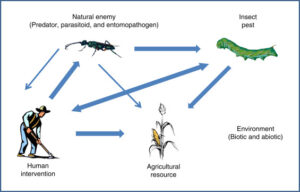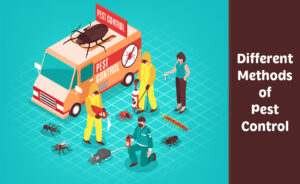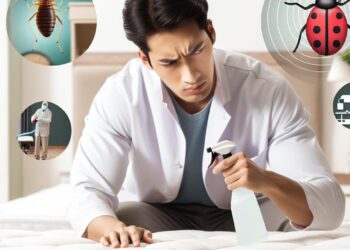Pest control is a common practice that is often used to control and eliminate unwanted insects, rodents, and other pests that can invade our homes and businesses. While traditional pest control methods often rely on the use of harsh chemicals and pesticides, there is growing concern over the potential harm these methods can cause to both humans and the environment.
Thankfully, there are many humane methods of pest control available that are not only effective but also safer for both humans and the environment. In this article, we will explore the benefits of using humane methods for pest control.

Reduced Exposure to Harmful Chemicals
One of the primary benefits of using humane methods for pest control is that it reduces exposure to harmful chemicals. Traditional pest control methods often rely on the use of toxic chemicals that can be hazardous to both humans and animals. These chemicals can cause respiratory problems, skin irritation, and even lead to long-term health issues such as cancer.
In contrast, humane pest control methods such as trapping and exclusion methods, use non-toxic and natural methods that are safe for humans and animals. For example, traps can be baited with food to attract pests, and once caught, the pests can be released back into the wild. Similarly, exclusion methods involve sealing off entry points to prevent pests from entering a building, without the use of chemicals.
Preserves Natural Ecosystems
Another benefit of humane pest control methods is that they preserve natural ecosystems. Traditional pest control methods often rely on the use of broad-spectrum chemicals that not only kill pests but also harm other beneficial insects and animals. This can disrupt the balance of ecosystems, leading to unintended consequences.
Humane pest control methods, on the other hand, are more targeted and focused on specific pests. For example, using pheromone traps to control insect pests such as moths and beetles can help preserve beneficial insects such as bees and butterflies. This allows ecosystems to remain balanced and ensures that all organisms can continue to thrive.
Cost-Effective
Using humane pest control methods can also be cost-effective in the long run. Traditional pest control methods often require multiple applications of pesticides, which can be expensive over time. In addition, the chemicals used in traditional pest control methods can be harmful to the environment, which can lead to costly clean-up efforts.
In contrast, humane pest control methods are often one-time solutions that do not require repeated applications of toxic chemicals. While the initial investment in humane pest control methods may be higher, the long-term savings in both cost and environmental impact make it a more cost-effective solution.
More Effective in the Long Run
Humane pest control methods are also more effective in the long run. Traditional pest control methods often target the symptoms of the pest problem, rather than the root cause. For example, using pesticides to kill cockroaches may temporarily reduce their population, but it does not address the underlying issue of what is attracting them to the area in the first place.
In contrast, humane pest control methods focus on the underlying cause of the pest problem, such as identifying and eliminating entry points or removing sources of food and water. This approach not only eliminates the current pest problem but also helps prevent future infestations from occurring.

Promotes Sustainability
Using humane pest control methods also promotes sustainability. As the world becomes more aware of the impact humans have on the environment, it is becoming increasingly important to find sustainable solutions that minimize harm to the environment. Humane pest control methods are one such solution.
By using natural and non-toxic methods, humane pest control helps reduce the overall impact on the environment. In addition, by preserving natural ecosystems and maintaining a balance between different organisms, humane pest control helps ensure long-term sustainability.
Using humane methods for pest control offers many benefits. It reduces exposure to harmful chemicals, preserves natural ecosystems, is cost-effective, more effective in the long run, and promotes sustainability. As awareness of the impact of traditional pest control methods continues to grow, it is essential that we explore and implement more humane and environmentally friendly solutions.
It is important to note that while humane pest control methods can be effective, they may not be suitable for all pest infestations. In some cases, more traditional methods may be necessary. However, in most cases, there are humane solutions available that can be just as effective, if not more so, than traditional methods.
If you are considering using humane pest control methods, it is important to work with a reputable and experienced pest control company. They can help you determine the best solution for your specific pest problem and ensure that it is carried out safely and effectively.
In addition to using humane pest control methods, there are also steps that you can take to prevent pest infestations from occurring in the first place. These include properly storing food and waste, sealing entry points, and maintaining a clean and dry environment.
By taking these steps and utilizing humane pest control methods, we can help protect both ourselves and the environment from the harmful effects of traditional pest control methods.
Furthermore, the benefits of using humane pest control methods extend beyond the immediate environment. By reducing the use of toxic chemicals and preserving natural ecosystems, we are helping to create a healthier planet for future generations.

Additionally, the use of humane pest control methods can also benefit businesses and homeowners in terms of their reputation. Consumers are becoming increasingly environmentally conscious and are more likely to choose companies and products that prioritize sustainability and animal welfare. By using humane pest control methods, businesses can demonstrate their commitment to these values and attract more customers as a result.
Finally, the use of humane pest control methods can also benefit animals. Traditional pest control methods often result in the unintended killing of non-target species, such as birds, reptiles, and mammals. Humane pest control methods minimize the risk of harming non-target species, allowing them to continue to thrive in their natural habitats.
Conclusion
The benefits of using humane pest control methods are clear. By reducing exposure to harmful chemicals, preserving natural ecosystems, being cost-effective, more effective in the long run, promoting sustainability, protecting reputation, and benefiting animals, humane pest control methods offer a safer, more sustainable, and more ethical solution to pest control. While traditional methods may still be necessary in certain situations, it is essential that we prioritize the use of humane methods wherever possible. By doing so, we can create a healthier and more harmonious world for all.















